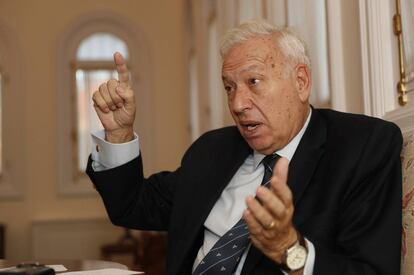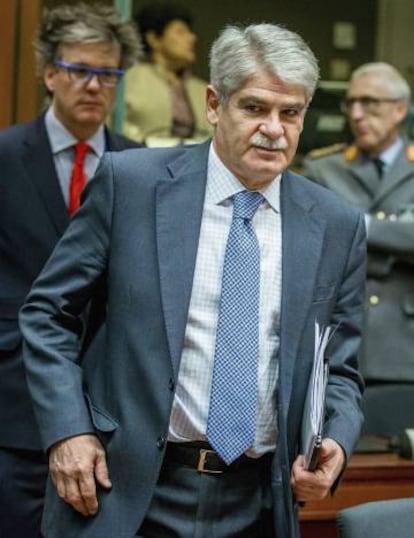Spain’s ex-foreign minister: “In politics, silence is not golden”
José Manuel García-Margallo discusses his tendency to speak his mind about divisive issues

Just 10 days after handing over the foreign affairs portfolio to his successor, Alfonso Dastis, José Manuel García-Margallo, 72, is busy promoting his new book Europa y el porvenir (or, Europe and the future), which he co-wrote with Fernando Eguidazu, state secretary for the EU.
Question. You mean to say that Europe has a future?
Answer. It has to, even if it is currently at a crossroads. Some people feel this is because we’ve moved too fast with European construction. But I defend the opposite theory.
The unity of Spain will be more securely guaranteed if it rests on people’s feelings and not just on the law
Q. Yet the Brexit vote suggests Europe can be deconstructed, that the process is reversible.
A. That is why we either make a leap forward now, or we will find ourselves in a difficult position. There are attempts at renationalizing politics, and europhobe and populist movements are growing.
Q. What do you regret not having done as foreign minister?
A. I did not have time to modernize the Spanish foreign service, which still reflects the world as it was 50 years ago.
Q. And do you wish you had kept quiet on the odd occasion?
A. I think that politics is educational; citizens have the right to have politicians explain what they are doing, and I have tried to fulfill that duty.

Q. You never got a rap on the knuckles from La Moncloa [the seat of government] for talking too much?
A. No... To be more specific, my idea of reforming the Constitution was not shared. [Prime Minister Mariano] Rajoy felt it was not the right time, and I did not bring it up again. I have been bold with my proposals, but disciplined when a decision was made.
Q. For a long time you were the only minister to openly talk about the Catalan separatist challenge. The general rule seemed to be to ignore the matter rather than tackle it...
A. What worried me from the beginning was that this space was being left wide open for the pro-secession camp to tell their story without an alternative narrative to oppose it. Besides, the Catalan challenge is playing out outside our borders, in the United Nations and the European Union...
Q. But did you feel backed by the government?
A. I felt backed by my conscience. If we had insisted more, separatist sentiment would not have expanded so much, and many Catalans who felt defenseless would have felt protected. I did what I felt I had to do, and I know there was a significant price to pay, I am perfectly aware of it, but I believe that in politics silence is not golden, because it can come across as acquiescence. I am not afraid of defending my ideas.
Q. You did not defend dealing with the Catalan challenge merely through the law.
A. I believe that it is necessary to do politics. The unity of Spain will be much more securely guaranteed if it rests on people’s feelings and not just on the law.
I have been bold with my proposals, but disciplined when a decision was made
Q. It’s been said that you held hopes of being Rajoy’s successor.
A. That is a piece of infamy that was conveniently spread around.
Q. Do you feel that your friendship with Rajoy has deteriorated over the last few years?
A. I very much hope not. It would be very painful if that were the case.
Q. Authorities in Gibraltar will be among those who celebrated that you are no longer the foreign minister.
A. I have no doubt about it, which means that I was right in the first place, but I also think that their joy is premature. I am certain that no Spanish government will waste the opportunity presented by Brexit.
Q. Is Donald Trump a danger?
A. Of course he is. Some of the things he has promised to do are impossible to carry out, and he will not do them. But what scares me is that there are so many people who supported the kind of populist option that he represents.
English version by Susana Urra.
Tu suscripción se está usando en otro dispositivo
¿Quieres añadir otro usuario a tu suscripción?
Si continúas leyendo en este dispositivo, no se podrá leer en el otro.
FlechaTu suscripción se está usando en otro dispositivo y solo puedes acceder a EL PAÍS desde un dispositivo a la vez.
Si quieres compartir tu cuenta, cambia tu suscripción a la modalidad Premium, así podrás añadir otro usuario. Cada uno accederá con su propia cuenta de email, lo que os permitirá personalizar vuestra experiencia en EL PAÍS.
¿Tienes una suscripción de empresa? Accede aquí para contratar más cuentas.
En el caso de no saber quién está usando tu cuenta, te recomendamos cambiar tu contraseña aquí.
Si decides continuar compartiendo tu cuenta, este mensaje se mostrará en tu dispositivo y en el de la otra persona que está usando tu cuenta de forma indefinida, afectando a tu experiencia de lectura. Puedes consultar aquí los términos y condiciones de la suscripción digital.









































